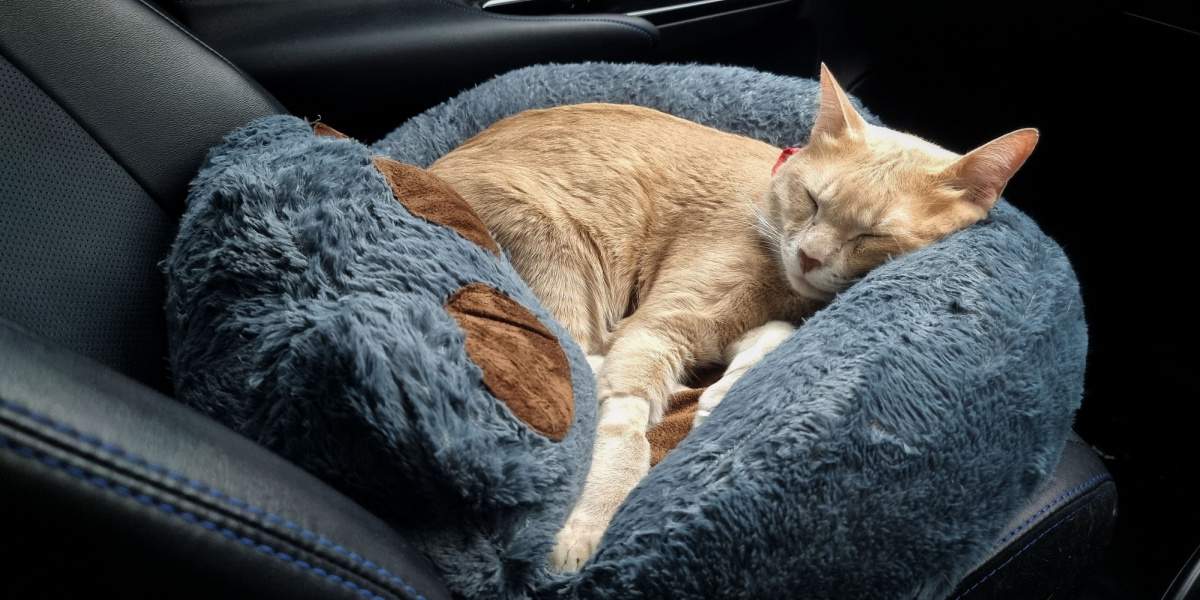
If you have to travel with your cat, it’s not always easy. Whether it’s a short trip to the veterinary clinic or cattery, or a longer trip for a vacation, you don’t want your cat to feel distressed. Of course, in an ideal world, you would avoid traveling with your cat if it affects them (and you) badly, but certain trips are unavoidable.
Many cats dislike care travel due to the random movement, loud noises, and motion sickness. You can make car travel less stressful for your cat by using pheromones or calming sprays , choosing an appropriate carrier, and reducing loud noises in the car. Speak to your veterinarian about light sedatives, calming medications, and anti-nausea medications for cats that get very stressed in the car.Key Takeaways
Let’s find out why cats struggle with traveling and what options you have if you want to help make it easier for them.
Why Might Cats Struggle With Traveling?
As humans, we might find traveling boring, or uncomfortable, or if we suffer from motion sickness it might make us nauseous. These issues can affect cats as well, but they also have other aversions to travel.
1. Anxiety
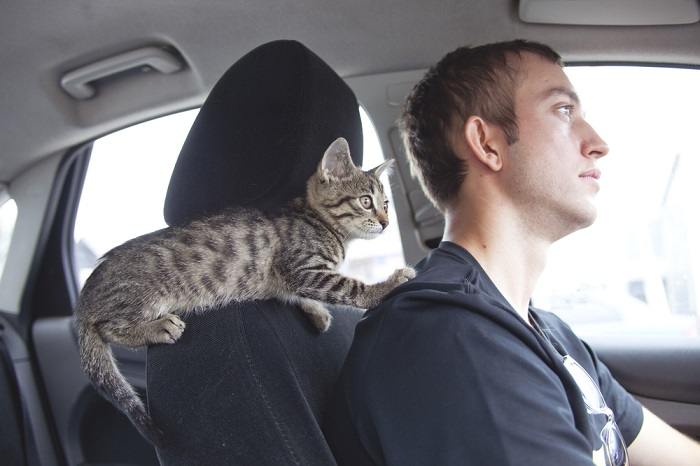
Most cats don’t travel by car very often, so they can find it anxiety provoking.
Cats don’t like anything out of the ordinary. They’re creatures of habit and enjoy the familiar. So. If they find themselves in a setting like a car, with unfamiliar sights, sounds, and smells, it can make them very anxious. If your cat gets stressed in the car, you might notice them vocalizing loudly, trying to break free from the cat carrier, or even open-mouth breathing.
Over time, stressful events can lead to health problems, including cystitis and other urinary issues as well as overgrooming, so if your cat has been subjected to stress, it’s important to keep an eye out for any signs that something is amiss.
Also Read: The Best Cat Carriers
2. Nausea
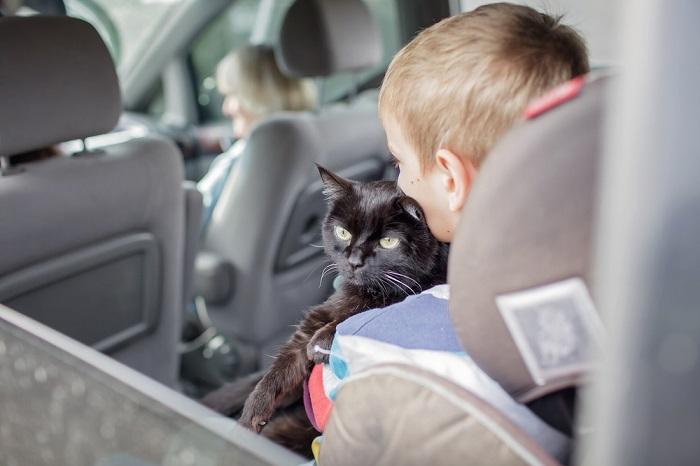
Some cats suffer from motion sickness, which can make travel very unpleasant for them.
Just like humans, cats can experience travel sickness. This could be due to the motion of the vehicle but could also be exacerbated by warm temperatures and distress. Even if your cat doesn’t vomit during car journeys, they might still be feeling nauseous. Keep an eye out for telltale signs like drooling and vomiting.
Also Read: Best Large Cat Carriers For Travel Reviewed
3. Noise

The sound of the car and other road sounds can bother a cat’s sensitive hearing.
Cats are very sensitive to noise and have excellent hearing. You’ve probably noticed their ears twitching in response to very small noises around the house. Much louder noises like the car engine, horns, or music from the stereo could leave your cat incredibly frightened.
Also Read: 7 Sounds Cats Hate That You Should Avoid
4. Movement

Many cats find the movement involved with car travel uncomfortable or stressful.
Cats like to be in control of their movements, and I’m sure we can relate. Cats feel safer when they are in control and able to choose where they go and what they do. When placed in a cat carrier in a car, they don’t understand what’s going on and the movements as the car swerves, starts, and stops can seem random and scary.
Also Read: 8 Ways To Help a Scared and Fearful Cat Be Confident
5. Restriction
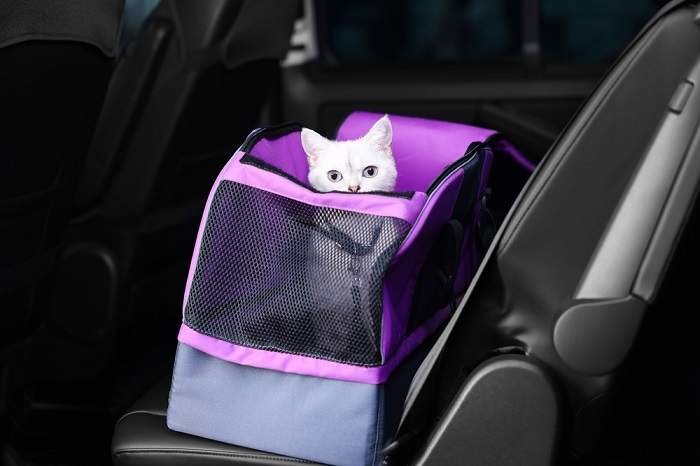
Although traveling in a carrier is safest, some cats don’t enjoy being confined.
Many cats like small spaces, but on their terms. So, you might find your cat chilling behind the sofa, in a tiny cardboard box, or in a drawer at the bottom of the wardrobe, but that doesn’t mean they’ll enjoy a trip in the cat carrier. When the element of choice is removed, being placed in a cat carrier and confined can make your cat feel powerless and anxious.
Also Read: Why Do Cats Sleep With Their Head Up?
How Can You Help Your Cat Cope Better With Travel?
With the best will in the world, it’s not always possible to keep your cat happy by avoiding travel altogether. Some trips are important, for instance, if you’re moving house, taking your cat for their annual veterinary checkup, or dropping them off at a boarding facility. So, what’s the solution for necessary trips? The good news is, you can help your cat feel better about traveling with a few proven tips.
1. Use Familiar Scents
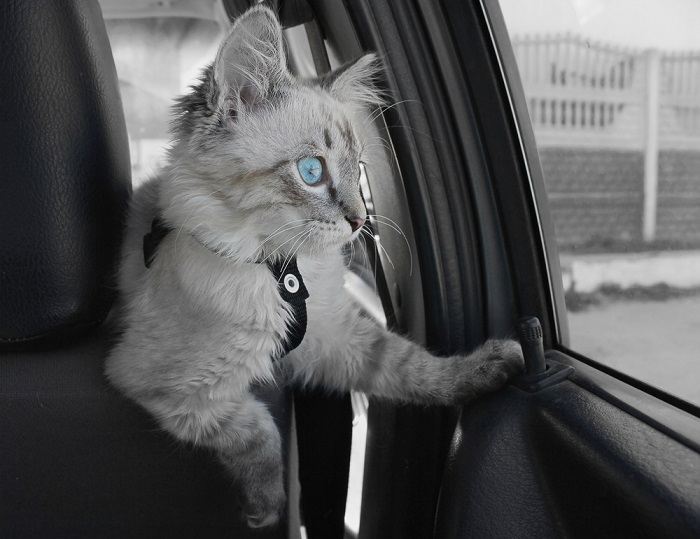
When traveling, bringing some scents of home can help your cat feel calmer.
Part of making your cat feel at ease is creating a more familiar environment to help them feel more secure and confident. A t-shirt or other item of clothing that smells of you, or a cozy blanket from their bed will help fill their senses with thoughts of home.
Also Read: What Are Cat Pheromones And Do They Really Work?
2. Choose The Right Carrier Or Other Restraint
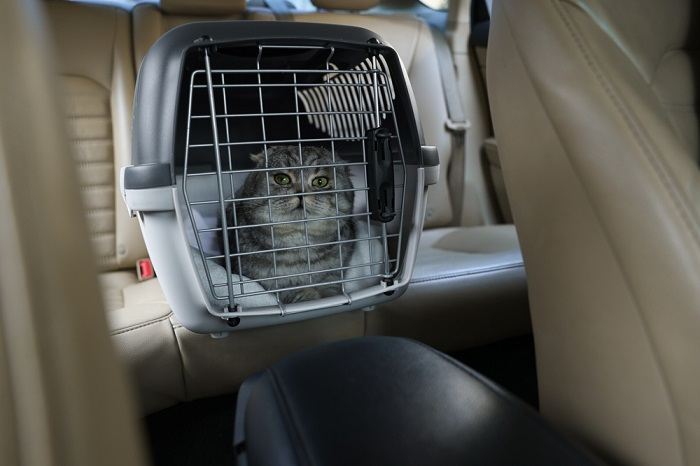
Cats can all have different preferences, so if your cat doesn’t seem to like their carrier, try something different.
There are lots of different types of cat carriers out there, so it’s worth trying to find one that suits your cat best. Some might prefer plenty of space, while others might prefer to feel enclosed in a smaller space.
Some might like to be able to see out, so a see-through plastic option might fit the bill, but others might prefer a dark space, covered by a blanket or towel. If you’re traveling on an airplane rather than a car, make sure you check the dimensions and type of carrier that is accepted by the airline.
For short journeys, you might choose to secure your cat in the car via a secure leash or harness, rather than using a carrier.
Also Read: How To Get A Cat Into A Carrier: 6 Steps For Success
3. Use Calming Sprays
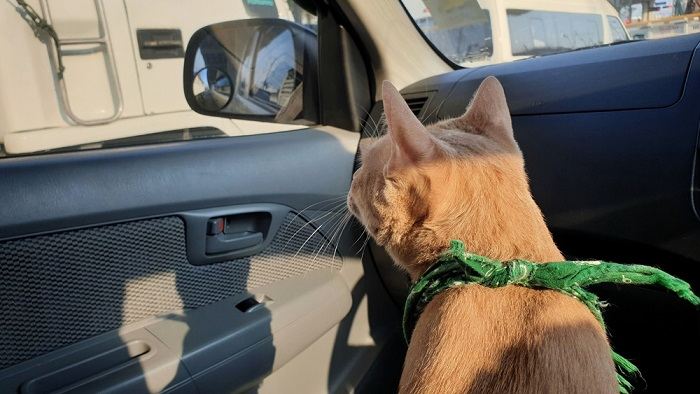
Cat pheromones and other calming products can help cats feel calmer in stressful situations.
Cat pheromones or calming sprays that contain valerian or other calming compounds can help to make your cat feel more relaxed. Feliway or Pet Remedy are just two examples of this. Try spraying a blanket or towel before placing it in your cat’s carrier. To get an even better calming effect, spray the area of the car where their carrier will be.
Also Read: Best Calming Aid For Cats
4. Reduce Noise

Turn the radio off in the car, or tune it to soothing music set to a low volume.
Blaring music from your car radio probably won’t help your cat feel calm. However, you could try playing classical or familiar music on a low volume to drown out the sound of the car engine and other traffic noise. Try to avoid engaging with and talking to your cat too much, as tempting as it is to comfort them. By giving them too much attention you can reinforce that there is something to be afraid of.
Also Read: 7 Sounds Cats Hate That You Should Avoid
5. Desensitize Them
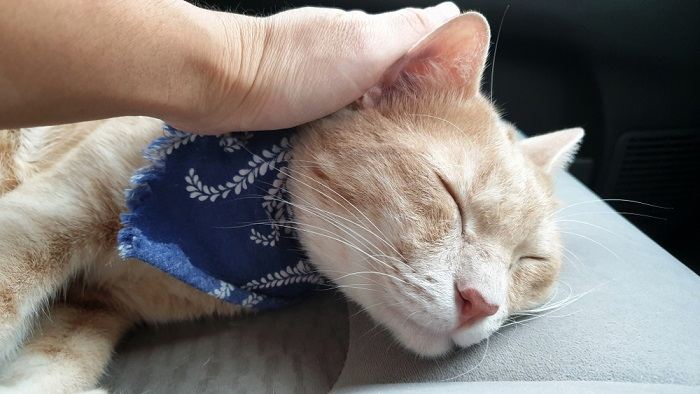
Cats can form negative associations with the car if you only ever go to the vet for unpleasant procedures.
If traveling is unavoidable, but it’s once in a blue moon, it might be worth trying to desensitize your cat. If they only go in the car to the vet, they’ll have a negative association with it. Try to take them on very short journeys regularly and reward them with treats and praise afterward to create a more positive experience that doesn’t affect them so much.
Also Read: The 7 Best Calming Cat Treats
6. Consider Sedation
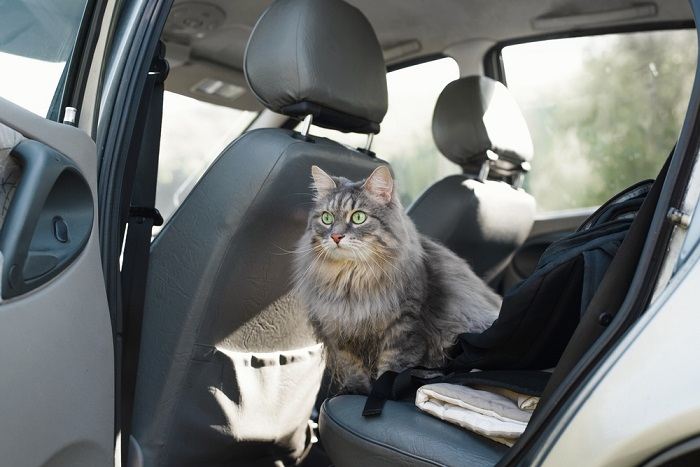
If your cat gets really distressed when they travel in the car, speak to your veterinarian about medication options like cat sedatives. Various veterinary medicines area available, from calming tablets to light and strong sedatives, including gabapentin, diphenhydramine (Benadryl), benzodiazepines, chlorpheniramine, and trazodone.
Stronger sedatives or a higher dosage of sedation that your veterinarian might use in the clinic are not suitable for travel because a sedated pet needs to be closely monitored and be with a suitably qualified person in case any intervention is required.
The veterinary medicine that your vet chooses will depend on whether your cat will take a tablet or would prefer a liquid form of medication, and will take into account your cat’s age and health.
Also Read: Drug Poisoning In Cats: Causes, Symptoms, & Treatment
Risks Associated With Sedating Cats For Travel
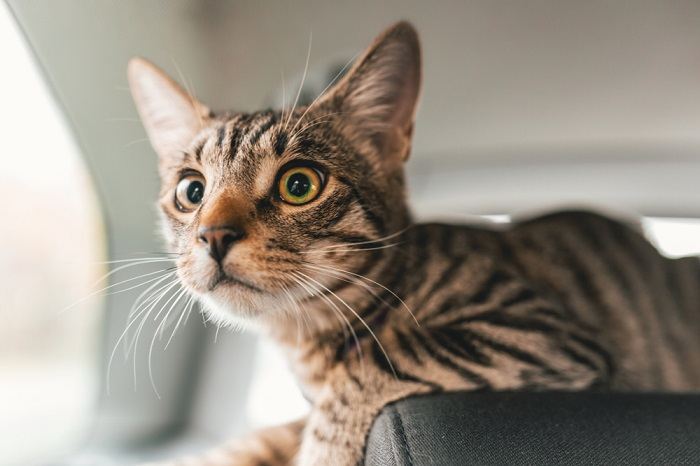
Even light sedatives carry some risks for your cat, even if you give the correct dose. First, if they have an underlying health problem like a heart condition, or liver or kidney disease, any medication could cause them to become unwell or even die.
That is why it’s particularly important to make sure your cat is checked over by a veterinarian and prescribed a sedative medication, rather than giving medication without veterinary advice.
Sedatives can also lead to side effects like vomiting, diarrhea, aggression, dry mouth, and lethargy and there is also a risk of anaphylaxis if your cat has allergies. These risks are some of the reasons why sedatives are not available over the counter and are only available on prescription.
Another worry is if your cat is sedated during a fearful event, certain medications might allow them to still be aware and afraid but unable to move or respond. This can create an even more negative experience and might make it even harder to travel with your cat in the future.
It’s upsetting hard if your cat becomes distressed during travel. However, it’s important not to give them any medication without speaking to a veterinarian first. It’s not safe to over-sedate your cat for a car journey because if anything went wrong a veterinarian or veterinary technician would need to administer additional medications.
Light sedatives, calming medications, and anti-nausea medications can be useful for cats that get very stressed in the car, so speak to your veterinarian about your options.
Also Read: The 5 Best Catnip Products For Cats (Spray & Toys and More Surprises)
Frequently Asked Questions
How do you calm a cat on a long car ride?
It's tempting to try to comfort your cat by talking to them on a long journey. However, unless you can talk to them normally, in a calm manner, it’s best to avoid speaking too much. If you act like you are trying to reassure them, you’ll be sending a message to them that there is something to be afraid of.
How do you drug cats on a road trip?
Never give your cat any drug for travel that hasn’t been prescribed by a veterinarian for that purpose. If you think your cat would benefit from medication during travel, ask your vet about the options available.
Why do cats freak out in cars?
Traveling in the car means random movement, loud noises, and generally feeling out of control. So, it’s not surprising that your cat might not enjoy a ride in the car. By adding familiar things and creating a safe and reassuring environment, you might find they feel a bit better.
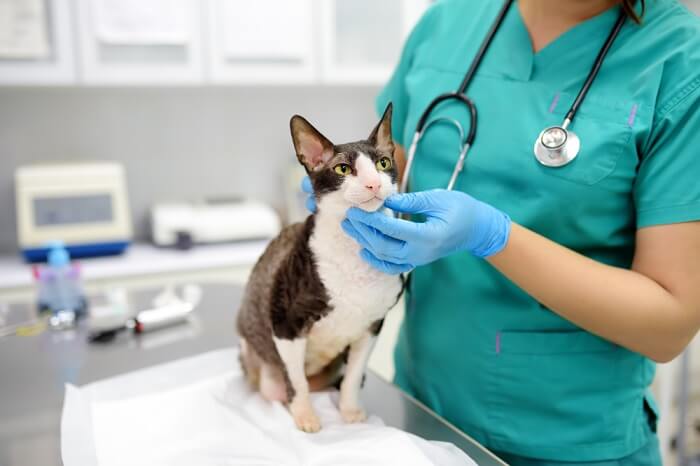







I drive around the country on the regular with 3-4 cats for show. They are used to it now. My old guy likes to travel.